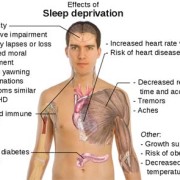THE IMPORTANCE OF SLEEP
A lot of things affect our ability to get a full night’s sleep. Stress, relationships, responsibilities, work, bills, worries, parenting, travel, illness, health all have differing degrees of affect on each of us and our mental and physical well being. You may not be able to control or eliminate all of these factors but you can create an environment that promotes a more restful night.
Research on sleep loss has told us that even one night with less than 7 – 8 hours of restful, full sleep cycle completion can have profound affects on our health. Get less than 6 hours and next day you are hungrier, have decreased insulin resistance and therefore are pre-diabetic, are more likely to catch a cold as a result of decreased immune system function, have an increased risk of injury or being in an accident, had less tissue repair overnight as growth hormone and testosterone secretion was decreased, your autonomic nervous system will be out of balance and your body will feel the same as if you were over-trained, you will be more emotional and less approachable, your alertness, decision making and memory will be decreased as a result of decreased cognitive function.
Less than 6 hours of sleep per night over 10 – 14 years has been shown to increase the risk of stroke, obesity, cancer, diabetes, heart disease and death. Research suggests there is the potential for loss of brain tissue, decreased ability to improve perceptual and motor learning processes and decreased hormone function. Considering what one night of sleep loss does to the body, long term will have an even greater affect on your energy levels and therefore the decisions we make regarding our health and well-being.
We now know that a full night’s sleep allows our bodies to heal, repair, grow and create a better overall level of health and wellness. Lack of sleep and therefore proper recovery makes it very difficult to achieve any training results. In order to make changes the body must be working at or near optimal. The goal should be to create an environment that allows for a full 7 – hours consistently each night. Below is a list that is not difficult, overly time consuming, expensive, or requiring a special talent. A restful, full night of sleep and a fully functioning body can enhanced by…
1. Create a bedtime routine that is the same every night. Light pleasure reading, music, relaxation tape, a warm bath (unwinding activities) that occur at the same time each night.
2. Don’t eat of drink large amounts less than two hours before bedtime. Avoid foods that create upset stomach for you and decrease fluid intake later in the evening to avoid repeated trips to the bathroom.
3. Avoid exposure to light from electronic displays 1 – 2 hours prior to bedtime as they can suppress melatonin by up to 22%.
4. If you do get up at night avoid bright lights.
5. Avoid caffeine and nicotine as they are stimulates. Alcohol may help you fall asleep but it prevents restful and meaningful recovery.
6. Regular daily exercise/physical activity increases the quality of sleep. You should finish higher intensity exercise at least 2 hours prior to bedtime.
7. Stop anything that requires high mental focus at least 1 hour prior to bedtime. If you find it difficult to turn the brain activity down, create a list for the next day as this often is enough to put the mind at ease. Journaling at the end of the day is a great way to slow the body and mind.
8. Make your bedroom a cool, dark, quiet and comfortable place for YOU. What ever works best for you is what you should do. Special PJ’s, the proper pillow for you, ear plugs, humidifier, mattress, extra blankets, full/dark curtains – make it work for you.
9. Limit daytime naps to 1 hour or less and no naps after 3pm.
10. Control pets that are in the house. Can be as simple as closing the door or having kennels.
11. Find a relaxation technique or a stretching routine that helps you to unwind. There are so many options here from tapes to body movements to breathing exercises. With a little practice they can make all the difference.
12. Control health and wellness issues. This should be obvious but it shocks me how many of my clients negatively affect their bodies and still expect things to work normally. This can include drinking when you have gout, not eating on time when you have diabetes, eating spicy food, the list is endless.
For the most part all the above relate to mental and physical well being. Take care of the body and mind and sleep should be yours to enjoy. Not surprisingly the list on how to avoid sleep disorders is almost exact to the above. Small changes to lifestyle habits in diet, exercise, daily routines, a positive outlook and a little planning can help you get the restful sleep your body needs. If you have tried all of the above with little success and you regularly experience difficulty with sleep, repeatedly feel tired after getting 7 hours of sleep or have reduced or impaired ability to perform regular daytime activities it may be time to call your doctor. In cases where sleep is disordered it is suggested that you keep a sleep diary to help find the correct solution for you. This list makes it sound easy – and it is – if you don’t have a sleep disorder.
If you need help, seek it, sleep is vital to optimum health and body functioning




